Turn Back Time Read online
Page 2
Wynter laughed, thinking of how much she had wished for tennis courts and a chance to play when she’d been young. “No, ice skating. I started when I was two, and I can’t tell you how many times I landed on my face while trying to do triple axels.”
“Olympic aspirations, huh?” Pearce could see her on a rink, a trainer nearby, choreographed music coming through the speakers. Yeah. That fits.
Though Pearce’s tone was teasing, for some reason, Wynter didn’t mind. She shook her head. “Nope. Always wanted to be a doctor. You?”
“Yeah. Pretty much always.” Something dark passed through Pearce’s eyes, making them even darker, nearly black, and then was gone. She glanced at her free hand, which was streaked with dried blood. “I should go wash this off.”
Wynter recognized when a subject was off-limits. “I’ll go with you. I want to get a look at your lip once you get it cleaned up. You might need stitches.”
“I don’t think so.”
“Well, we’ll decide after we see it.”
Pearce grinned, ignoring the pain in her lip. She wasn’t used to letting anyone else call the shots. It was neither her nature nor the reputation she had acquired in the last four years. And because of who she was, others expected her to lead. It was refreshing to find someone who didn’t seem to care who she was. “Okay, Doc, whatever you say.”
“Very good,” Wynter said with an approving laugh. “But since you seem to be good at it, I’ll let you navigate.”
Once more, Pearce clasped Wynter’s hand in a motion so natural, Wynter barely gave it a thought. They stayed close to the buildings, skirting the crowds, until they reached Houston Hall. When they slipped inside the student center, the noise level mercifully fell.
“Oh, thank God,” Wynter murmured. “I might actually be able to think in a minute.” She glanced around the high-ceilinged room with its ornate carved pillars and marble floors. “These old buildings are amazing.”
“Where did you go to school?” Pearce asked.
“Jefferson.”
“Ha. We’re rivals.”
Wynter stopped, extricated her hand from Pearce’s grasp, and regarded her appraisingly. “Penn?”
“Uh-huh.”
The two medical schools, a mere twenty blocks apart, had sustained a rivalry since the eighteenth century. Over the decades, the competition had become more theoretical than real, but the students of each still claimed superiority.
“Well, then you better let me decide how bad the problem is,” Wynter said with utter sincerity.
“I might,” Pearce allowed, “if I didn’t care what my lip looked like when it was healed.”
They regarded one another, eyes locked in challenge, until their smiles broke simultaneously and they laughed.
“Let’s go upstairs,” Pearce suggested. “The bathrooms down here are going to be too crowded.” After years on campus, she knew the out-of-the-way restrooms that were never occupied, and quickly guided Wynter through the twisting hallways and up a wide flight of stone stairs. “Here we go.”
Pearce pushed the door open and held it for Wynter, who preceded her inside. There were three stalls, all empty. Wynter ran cold water in one of the sinks and pulled paper towels from the dispenser. She soaked several, folded them, and motioned for Pearce to lean over the sink. “I guess I don’t have to tell you this is going to sting.”
“I can do it.”
“I’m sure. But this way I can see what I need to see before you stir up the bleeding again.”
Pearce quirked an eyebrow. “You don’t have much faith in my skill.”
“Well, considering where you trained…” Wynter carefully loosened the crusted blood below the pink surface of Pearce’s lip. “Damn. This goes right through the vermilion border, Pearce. You probably should get stitches.”
“Let’s get a look.” Pearce leaned toward the mirror and squinted. “It’s not too deep. A Steri-Strip will probably take care of it.”
“And if it doesn’t, you’re going to have a very noticeable scar because of the color mismatch,” Wynter said pointedly.
“Jeez, you sound like a surgeon.”
“I hope so. That’s the plan.”
“Really? Where are you going?” It was the most common question of the day, but for Pearce, the day had held little excitement. She knew where she was going. She’d always known where she was going. Suddenly, she was much more interested in where Wynter would be going.
Embarrassed, Wynter sighed. “Actually…I don’t know.”
“Oh. Shit. Sorry. Look,” Pearce said hastily, “maybe I can help out. You know, with finding places that still have openings.”
Wynter frowned, trying to make sense of Pearce’s offer. Then, suddenly, she understood what she was saying. “Oh, no. It’s not that I didn’t match. Oh well—maybe I didn’t match, but…I just haven’t looked yet.”
“You’re kidding. You got your envelope three hours ago, and you haven’t looked yet? Why?”
Because I know it’s not going to say what I want it to say. Wynter didn’t want to admit the truth, especially not to this woman, and struggled for an explanation. “I was tied up on rounds. I didn’t get a chance.”
Unexpectedly bothered by Wynter’s obvious discomfort, Pearce didn’t push for further explanation. “Do you have the envelope with you?”
“Right here.” Wynter patted her back pocket.
“Well, come on. Let’s see it.”
For the first time, Wynter actually wanted to know, and she wanted Pearce to be the one who shared the moment with her. It didn’t make any sense, but she felt it all the same. With a deep breath, she pulled the envelope from her pocket and opened it in one unhesitant motion. She slid out the card, and then without looking at it, passed it to Pearce.
Pearce looked down, read the words, and hid the swift stab of disappointment. “Surgery. Yale–New Haven.” She met Wynter’s eyes. “Good place. Congratulations.”
“Yes,” Wynter said, not surprised. Her tone was flat. “Thanks.”
“Well. Let’s see to the rest of you.”
“What?” Wynter asked, still trying to decipher the odd expression on Pearce’s face. For an instant, she’d looked sad.
Pearce handed the card back and cupped Wynter’s jaw with both hands. She saw Wynter’s eyes widen in surprise. “Open,” she said, placing her thumbs over each temporomandibular joint. “Slowly, but go as far as you can.”
Wynter was aware of a rush of butterflies in the pit of her stomach and her face flushing. Pearce’s hands were not only strong, but gentle. They stood so close that their thighs brushed.
“Feels okay,” Wynter murmured as Pearce carefully circled the joints. Feels…wonderful.
Pearce slid her fingers along the border of Wynter’s jaw and over her chin. “Sore?”
Wynter shook her head. She couldn’t feel her chin. All she could feel was the heat of Pearce’s skin. She was breathing fast. So was Pearce. Pearce’s eyes had gotten impossibly dark, so dark that the pupils blended with the surrounding irises, creating midnight pools that Wynter was absolutely certain she could drown in.
“Pearce,” Wynter whispered. Whatever was happening, she couldn’t let it. But as she slipped further into Pearce’s eyes, she couldn’t recall why not. She forced herself to focus. “Don’t.”
“Hmm?” Pearce lowered her head, intent on capturing the hint of spice that was Wynter’s scent. She slid her hand around the back of Wynter’s neck as she very lightly kissed the tip of her chin where the bruise shadowed it. Her lips tingled and she tightened deep inside. “Better?”
“Much,” Wynter said teasingly, hoping to make light of the moment.
“It gets better,” Pearce said, her lids half closed, her mouth closing in on Wynter’s.
“I…Pearce…wait…” Wynter’s cell phone rang, impossibly loud, and she jumped. She fumbled for it, unable to look away. Pearce’s mouth was an inch from hers when she whispered, “Hello?” She listened, staring at
the pounding carotid in Pearce’s throat. “I thought you weren’t coming. Okay. Fine. I’m in the bathroom. I’ll be right out.” She closed the phone. Her voice was thick. “I have to go.”
“Why?” Pearce kept her hand on the back of Wynter’s neck and caressed her softly, tangling her fingers in Wynter’s hair. She knew what she saw in Wynter’s eyes. She’d seen it before, but it had never stirred her quite like this. “Got a date?”
“No,” Wynter said as she gently backed away, escaping Pearce’s grip, if not her spell. “It’s my husband.”
Standing absolutely still, Pearce said nothing as Wynter stepped around her and hurried out. When the door swung closed, leaving her alone, Pearce bent down and retrieved the forgotten white card. Wynter must have dropped it. She ran her thumb over the type, then slid the card into her breast pocket.
Goodbye, Wynter Kline.
Chapter Two
Four Years Later
Just as Pearce pulled her robin’s-egg blue 1967 Thunderbird convertible into the parking garage on South Street next to the University Museum, her beeper went off.
“Shit,” she muttered as she tilted the small plastic rectangle to check the readout. Five a.m. and the chaos was starting already. The number, however, wasn’t one of the nurses’ stations in the twelve-story Rhoads Pavilion, which housed most of the surgical patients. It was the chairman’s office. And at that hour of the morning, it wasn’t his secretary calling. It was him. “Fuck.”
She pulled the classic car into the angled slot in the far corner of the first floor next to the security guard’s tiny booth. It was a reserved space and one for which she paid premium rates, but she wasn’t about to let some idiot dent the vehicle that she had spent countless hours restoring. She knew all the guards would keep an eye on it. She tipped them every month in thanks. “Hey, Charlie,” she called as she climbed out.
“Good morning, Doctor,” the pencil-thin retired cop said. He wore his security guard uniform with the same pride with which he had worn the Philadelphia Police blues for thirty years. “Might better have left the baby home today. The news is calling for rain later. Could be snow if it gets a little colder.”
“I’ll leave the car here until spring, then,” Pearce yelled as she jogged toward the street. Her cell phone wouldn’t work in the parking garage. And it wouldn’t matter to her if it rained or snowed, because she was on call for the next twenty-four hours and would not be leaving the hospital for at least thirty. “You take good care of my girl, now.”
Charlie laughed and sketched a salute as she disappeared up the ramp.
Once on the sidewalk, she thumbed the speed dial and punched in the number. When it was answered by the voice she anticipated, she said, “Rifkin.”
“Would you stop by the office before rounds this morning?”
Although framed as a question, it wasn’t a request.
“Yes sir. I’m just outside the hospital.”
“Come up now, then.”
Pearce didn’t have time to reply before the call was cut off. Fuck. She ran through the list of patients on the chairman’s service, wondering if something had gone wrong that she didn’t know about. The junior surgery resident who had been on call the night before knew that he was to advise her of any problem, no matter how small. But other than several routine questions about transfusions and antibiotic coverage, she hadn’t gotten any calls of note. Despite the fact that her family home was only forty minutes away in Bryn Mawr and she could easily have had her own wing of the house and all the privacy she required, she lived in an apartment in West Philadelphia so that she could make it to the hospital in less than fifteen minutes. She did not like to be surprised by problems in the morning, and a call at this hour to the chairman’s office could only be a problem. Fuck.
The elevator was empty when she got in. It stopped at the second floor to admit a bedraggled blond with dark circles under her eyes, a bloodstained Rorschach on the left thigh of her scrub pants, and a crumpled piece of paper in her right hand that she studied as if it were the Holy Grail. Pearce knew it was “the list”—an inventory of all the patients on the service to which the resident was assigned, with coded notations as to each patient’s admission date, date of surgery, procedure performed, most recent lab tests, and outstanding test results. The work of the day—or night—centered around the list and, if an attending surgeon were to call for an update on one of their patients, everything the resident needed to know was on that single piece of paper. Even though every resident carried a PDA and there were computers at every nurses’ station, the “list” still prevailed as the source of all vital info. Without it, more than one resident had found himself giving incomplete or incorrect information, and in short order, had been looking for a new job. At least once a day, some frantic resident could be seen rushing through the halls asking all and sundry, “Have you seen my list? I lost my list. Has anyone seen my list?”
“Hey, Tam,” Pearce said. “How you doing?”
Tammy Reynolds looked up from the page, blinking as if she had awakened from a dream. Then she smiled slowly, some of the fatigue leaving her eyes. “Hey you. I haven’t seen you at O’Malley’s recently. Have you been hiding, or has someone been monopolizing all your time?”
“Neither. But I’m senior on the chief’s service, and it’s been busy.”
“I know which service you’re on.” She moved a little closer in the elevator and put her hand on Pearce’s waist. She circled her thumb on Pearce’s pale green scrub shirt, massaging the muscles underneath. “I pay attention to where you are. And you’re never too busy when you want something.”
Pearce moved back out of touching range, aware that they were slowing for the fifth floor. She didn’t want the doors to open and someone to see them. And she didn’t want Tammy’s attentions. At least, not right at the moment. “I gotta go. Take it easy, okay?”
“Call me. I’m on the onc service this month,” Tammy called as Pearce stepped off the elevator. “I could use some of your medicine, baby.”
Pearce lifted a hand in a parting wave, grateful that there was no one waiting in the hall who might’ve heard the comment. She didn’t care what her fellow residents knew or thought of her, but she preferred that her private business not become the topic of conversation among the administration. Well, at least not by her own invitation.
She walked along the maroon-carpeted hallway toward the large corner office. The staff surgeons’ offices were clustered in one corner of the fifth floor with the surgeons’ lounge adjoining them and the operating suites taking up the rest of the floor on the opposite side of the building. This arrangement enabled the surgeons to wait in their offices, working, until their cases were ready to go. Since it was a matter of routine for cases to begin late, it prevented lost time, something that every surgeon loathed. The secretarial spaces, separated from the hallway by waist-high partitions, were all empty. The office doors were closed. The administrative work of the day would not begin until eight thirty, and by that time, most of the surgeons would already be in the OR. She enjoyed the quiet, empty warren, and likened the stillness to the calm before the storm. She glanced at the yellow face of her Luminox sports watch and grimaced. Five fifteen. If this took more than a few minutes, she would be late meeting the other residents, and that was a bad precedent to set. As the most senior resident on the service, she organized the daily work schedule, assigned the more junior residents to assist on cases, and oversaw the night call rotations. She was always on time, if not early, because her behavior set the tone for her service, and she expected everyone to be prompt. She expected a lot of things, and if she didn’t get it, there was hell to pay.
She was the ultimate authority over all things resident-related on the chief’s service, the busiest of the general surgery services. The only individual in the hospital with more power within the resident hierarchy was the chief surgical resident, and he was in charge of his own service and outpatient clinic—for all practical purposes
functioning as a junior attending with only minimal supervision from the attending surgeons.
“I hope this is quick,” she muttered as she approached the closed door to the chairman’s office. An unassuming plastic nameplate next to the door announced his name. Ambrose P. Rifkin, M.D., Chairman.
She knocked on the door.
“Come in.”
His desk was situated in the far corner of the room, angled so that he sat with his back to the two walls of windows, as if the outside world were a distraction or, at the very least, of no interest to him. It also allowed him to look at his visitors with the sun at his back, and in their eyes. He knew how to position himself to advantage.
“Pearce,” he said, gesturing to the two armchairs in front of his broad walnut desk. The dark furniture and thick area rugs lent the room a traditional air, heavy and rich, and suited his style. Though he was in his mid-fifties, his thick hair was still midnight black, his aquiline features patrician, and his body trim from twice-weekly squash matches. He looked—and was—a commanding presence.
“Sir,” she said as she sat. The last time she’d seen him had been the previous afternoon when she’d assisted him on a low anterior colon resection. They’d said nothing to one another during the case, other than when she had provided him with the pertinent patient history and he had asked her to outline the plan for removing the constricting carcinoma that was lying in the patient’s pelvis. She’d answered succinctly and accurately. He’d said nothing until an hour and a half later, when he’d stepped back from the table and said, “I have a meeting. Close her up.”
He’d left without waiting for her reply. Now, the sound of his modulated baritone brought her back to the moment, and she realized she’d missed the first part of his sentence.
“…resident.”
Pearce straightened, her forearms resting on the wooden arms of the chair. She was careful not to grip the armrests and allow him to see that she was nervous. “I’m sorry, sir. I didn’t get that.”

 Secrets of the Heart
Secrets of the Heart Clinical Trials
Clinical Trials Blessed Benediction
Blessed Benediction Happy, Happy Birthday, Baby
Happy, Happy Birthday, Baby Cost of Honor
Cost of Honor Love on the Night Shift
Love on the Night Shift Top of the Class & Bonus Night
Top of the Class & Bonus Night You Don’t Bring Me Flowers
You Don’t Bring Me Flowers When Dreams Tremble
When Dreams Tremble Firestorm
Firestorm The Color of Love
The Color of Love Women of the Dark Streets
Women of the Dark Streets Radclyffe - (Honor 4) - Honor Guards
Radclyffe - (Honor 4) - Honor Guards Honor 03 - Love And Honor
Honor 03 - Love And Honor Love's Masquerade
Love's Masquerade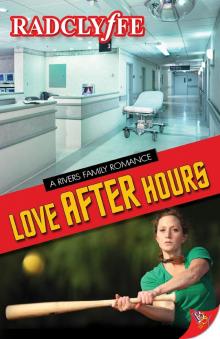 Love After Hours
Love After Hours OMGQueer
OMGQueer A Matter of Trust
A Matter of Trust Honor Under Siege
Honor Under Siege Best Lesbian Romance 2009
Best Lesbian Romance 2009 Honor 06 - Honor Under Siege
Honor 06 - Honor Under Siege Best Lesbian Romance 2012
Best Lesbian Romance 2012 Breathless
Breathless Nick of Time
Nick of Time The Lonely Hearts Club
The Lonely Hearts Club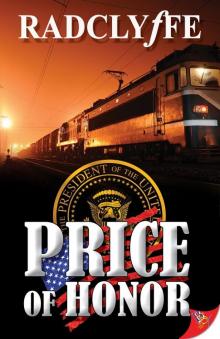 Price of Honor
Price of Honor Word of Honor fr-7
Word of Honor fr-7 Winds of Fortune (Provincetown Tales Book 5)
Winds of Fortune (Provincetown Tales Book 5) Above All, Honor
Above All, Honor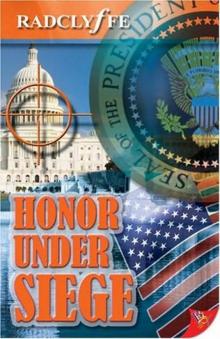 Radclyffe - Honor 06 - Honor Under Siege
Radclyffe - Honor 06 - Honor Under Siege Distant Shores, Silent Thunder
Distant Shores, Silent Thunder Word of Honor
Word of Honor Word Play
Word Play Fated Love
Fated Love Homestead
Homestead Radical Encounters
Radical Encounters Heart Stop
Heart Stop Code of Honor
Code of Honor Myth and Magic
Myth and Magic Wild Shores
Wild Shores Oath of Honor
Oath of Honor Desire by Starlight
Desire by Starlight Love Burns Bright
Love Burns Bright Promising Hearts
Promising Hearts Helplessly Hers
Helplessly Hers Love & Honor h-3
Love & Honor h-3 All About Us
All About Us Honor 01 - Above All Honor
Honor 01 - Above All Honor Honor 05 - Honor Reclaimed
Honor 05 - Honor Reclaimed Innocent Hearts
Innocent Hearts Taking Fire
Taking Fire In Pursuit of Justice
In Pursuit of Justice Love's Melody Lost
Love's Melody Lost Passion's Bright Fury
Passion's Bright Fury Returning Tides
Returning Tides Change of Pace
Change of Pace Safe Harbor
Safe Harbor Night Call
Night Call Honor 04 - Honor Guards
Honor 04 - Honor Guards Honor Bound
Honor Bound Cruising the Strip
Cruising the Strip Above All, Honor h-1
Above All, Honor h-1 Honor Reclaimed
Honor Reclaimed Trauma Alert
Trauma Alert Love On Call
Love On Call Best Lesbian Romance 2014
Best Lesbian Romance 2014 Discovery
Discovery shadowland
shadowland Justice for All
Justice for All Best Lesbian Romance 2011
Best Lesbian Romance 2011 Turn Back Time
Turn Back Time Winds of Fortune
Winds of Fortune Honor Guards
Honor Guards Justice in the Shadows
Justice in the Shadows Love's Tender Warriors
Love's Tender Warriors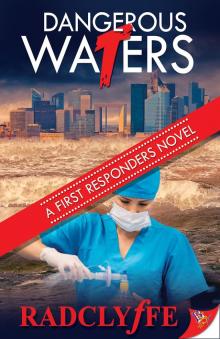 Dangerous Waters
Dangerous Waters First Sight
First Sight By the Light of the Moon
By the Light of the Moon Honor 07 - Word Of Honor
Honor 07 - Word Of Honor Tomorrow's Promise
Tomorrow's Promise Amor and More
Amor and More Best Lesbian Romance 2010
Best Lesbian Romance 2010 Sheltering Dunes (Provincetown Tales Book 7)
Sheltering Dunes (Provincetown Tales Book 7) Love And Honor
Love And Honor Secret Hearts
Secret Hearts Prescription for Love
Prescription for Love Passionate Rivals
Passionate Rivals Against Doctor's Orders
Against Doctor's Orders Radclyffe - Honor 01 - Above All, Honor
Radclyffe - Honor 01 - Above All, Honor Honor 02 - Honor Bound
Honor 02 - Honor Bound Beyond the Breakwater
Beyond the Breakwater Radclyffe - (Honor 5) - Honor Reclaimed
Radclyffe - (Honor 5) - Honor Reclaimed Storms of Change
Storms of Change Honor Bound h-2
Honor Bound h-2 Justice Served
Justice Served Sheltering Dunes
Sheltering Dunes Best Lesbian Romance of the Year
Best Lesbian Romance of the Year Secrets in the Stone
Secrets in the Stone